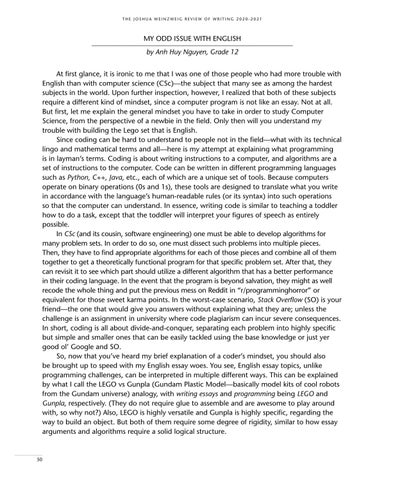THE JOSHUA WEINZWEIG REVIEW OF WRITING 2020-2021
MY ODD ISSUE WITH ENGLISH ____________________________________________________________ by Anh Huy Nguyen, Grade 12 At first glance, it is ironic to me that I was one of those people who had more trouble with English than with computer science (CSc)—the subject that many see as among the hardest subjects in the world. Upon further inspection, however, I realized that both of these subjects require a different kind of mindset, since a computer program is not like an essay. Not at all. But first, let me explain the general mindset you have to take in order to study Computer Science, from the perspective of a newbie in the field. Only then will you understand my trouble with building the Lego set that is English. Since coding can be hard to understand to people not in the field—what with its technical lingo and mathematical terms and all—here is my attempt at explaining what programming is in layman’s terms. Coding is about writing instructions to a computer, and algorithms are a set of instructions to the computer. Code can be written in different programming languages such as Python, C++, Java, etc., each of which are a unique set of tools. Because computers operate on binary operations (0s and 1s), these tools are designed to translate what you write in accordance with the language’s human-readable rules (or its syntax) into such operations so that the computer can understand. In essence, writing code is similar to teaching a toddler how to do a task, except that the toddler will interpret your figures of speech as entirely possible. In CSc (and its cousin, software engineering) one must be able to develop algorithms for many problem sets. In order to do so, one must dissect such problems into multiple pieces. Then, they have to find appropriate algorithms for each of those pieces and combine all of them together to get a theoretically functional program for that specific problem set. After that, they can revisit it to see which part should utilize a different algorithm that has a better performance in their coding language. In the event that the program is beyond salvation, they might as well recode the whole thing and put the previous mess on Reddit in “r/programminghorror” or equivalent for those sweet karma points. In the worst-case scenario, Stack Overflow (SO) is your friend—the one that would give you answers without explaining what they are; unless the challenge is an assignment in university where code plagiarism can incur severe consequences. In short, coding is all about divide-and-conquer, separating each problem into highly specific but simple and smaller ones that can be easily tackled using the base knowledge or just yer good ol’ Google and SO. So, now that you’ve heard my brief explanation of a coder’s mindset, you should also be brought up to speed with my English essay woes. You see, English essay topics, unlike programming challenges, can be interpreted in multiple different ways. This can be explained by what I call the LEGO vs Gunpla (Gundam Plastic Model—basically model kits of cool robots from the Gundam universe) analogy, with writing essays and programming being LEGO and Gunpla, respectively. (They do not require glue to assemble and are awesome to play around with, so why not?) Also, LEGO is highly versatile and Gunpla is highly specific, regarding the way to build an object. But both of them require some degree of rigidity, similar to how essay arguments and algorithms require a solid logical structure.
–––––––––––––––––––––––––––––––––––––––
50











